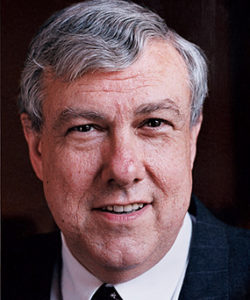Bernard Bailyn was a great teacher and a man of profound intellect and curiosity who was eager even in his nineties to incorporate new material and ideas into his synthesis of the past. I propose to offer two illustrations.
The great teacher.
When I finished law school in 1965, I knew I wanted to become a law professor. I also knew that I had no knowledge of how to do one of the most important parts of a professor’s job – namely, how to write scholarship. So I went to Harvard to learn how to be a scholar in history, the subject in which I had majored in college. I also went with a topic proposed by my law school mentor, John Reid, who wanted me to write an article about how the people of Massachusetts dealt with matters of law when the state’s courts were closed during the American Revolution.
When I arrived at Harvard, I immediately learned that I should take Bailyn’s seminar, but that I needed his permission, which had to be obtained by proposing a topic that he liked. I proposed my topic. He said it couldn’t be done because there were no sources. He was certainly correct that it was not a topic for a young graduate student who would have spun wheels searching for sources. He told me instead to go to the courthouse in Lechmere Square, where there was a trove of documents that no one had ever examined.
I went to the courthouse, found a mountain of documents, and began to work my way slowly through them. After about a month, we were required to turn in an outline of what we were prepared to write. I turned in something incoherent that I don’t remember. What I do remember is Bailyn’s response: skim the sources more quickly until you see something changing; then, describe the change and explain how and why it happened. I have been following that advice, which is brilliant, for over 50 years and have produced a large and I hope significant body of scholarship as a result.
The profound intellect.
About three years ago I wanted to see Bailyn and arranged to meet him at an annual dinner of the Society of Fellows. We talked for about three hours. In particular, I had to tell him that in volume 4 of The Common Law in Colonial AmericaI was challenging much of his thesis in The Ideological Origins of the American Revolution. I noted that many of the men whose work he had studied were lawyers and that their pamphlets were legal arguments, not ideological ones, made to advance the interests, often economic in nature, of their clients. He immediately grasped the thrust of my challenge – that materialist interpretations of history cannot be killed by examining legal arguments made to advance the economic interests of clients.
I was worried that Bailyn might be upset or angry with me. Instead, he wrote an endorsement for the rear jacket of volume 4, which I quote in part: “The book will shape all future studies of the legal foundations of America’s public life and all future interpretations of the Revolution.”
Of course, Ideological Origins remains relevant. Why did the lawyers make the arguments they made rather than different ones? Lawyers make arguments to persuade people, and the lawyers Bailyn studied in Ideological Origins probably thought that the pamphlets they wrote would be persuasive to people in the colonies. Ideas matter. In addition, the arguments made by revolutionary lawyers affected the way American institutions were structured in the Revolution’s aftermath.


 He is the author of numerous books and articles, including his four volume history of the common law in early America,
He is the author of numerous books and articles, including his four volume history of the common law in early America,